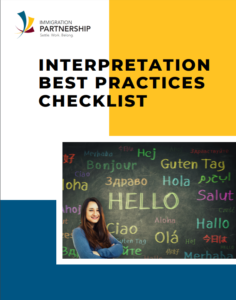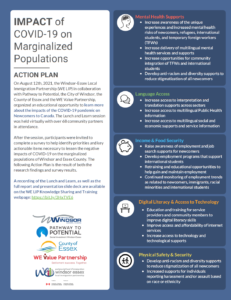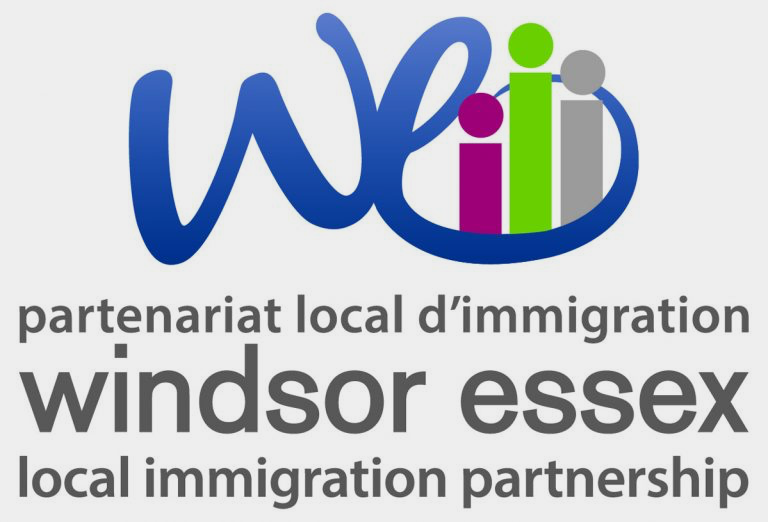WE LIP Menu
The sharing of knowledge, best practices, and training opportunities, is a central priority at WE LIP. Below you will find videos and links to a variety of resources and information designed to share with partners and communities, details of WE LIP work, other LIP work, community work, and the sharing of lessons learned along the way.
Knowledge Sharing
Basics of Equity, Diversity, and Inclusion: What Do We Know So Far?
On January 26th, 2023, the Windsor Essex Local Immigration Partnership hosted a session to re-introduce the definitions of Equity, Diversity and Inclusion as elements of support to an increasingly diverse society. Dr. Riham Al-Saadi, Sessional Instructor, School of Social Work, University of Windsor and WE LIP Executive Member at Large delivered a presentation and led council members through a discussion which covered the concept of antiracism and the different approaches it can be applied. As well, practical examples of how these concepts can be integrated into our daily practice and future goals of enhancing application of such critical concepts in professional practice were identified.
View the recording here:
Virtual Language Access Day Panel Discussion
On January 24th, 2023, the Windsor Essex Local Immigration Partnership, in partnership with the Waterloo Region Immigration Partnership and the Hamilton Immigration Partnership Council, hosted a virtual panel discussion centered on the importance of equitable language access to community programs and services.
About the speakers:
Yusuf Al-Harazi is currently serving as the Diversity, Equity, and Inclusion (DEI) Advisor at Niagara Region. In this capacity, he is responsible for the implementation of the five year DEI Action Plan which includes components such as cultural humility training and inclusive communication. In a previous role with the Niagara Folk Arts Multicultural Centre, Yusuf has worked with diverse newcomer and immigrant populations, where he has been instrumental in creating safe spaces and facilitating access to various programs and services from an equity and inclusive language lens. He is also a former peer champion through OCASI’s gender-based violence campaign. Yusuf will be speaking on the importance of language access for newcomers facing Gender-Based Violence, and providing strategies for successful implementation.
Christine Kouri, BScN, MHA, is the Manager for Health Equity and Diversity for CHEO (Canada’s capital’s pediatric healthcare centre). In this role, she is overseeing a 3 year federally funded project to develop a Canadian Newcomer Navigator Network, in addition to leading special projects at CHEO to advance its health equity efforts, including being CHEO’s lead for its EDI Task Force. Christine will be providing perspective of language access through the healthcare lens as well as speak on the National Newcomer Integration Network’s (N4) position paper to help provide audience members research to base their future and continued inclusion of language access resources in their institutions.
Fauzia Baig is the Region of Waterloo’s first Director of Diversity, Equity & Inclusion board member of the Coalition of Muslim Women, and the Co-Chair on the Waterloo Region’s Mayor’s Task Force for Equity, Diversity and Inclusion. Fauzia’s focus on diversity in institutions such as the Region of Waterloo will provide perspective on the importance of language access in from a Municipal lens. She will discuss her experience in her key role working alongside staff and community leaders to improve equity and innovate the way the Waterloo Region works with newcomer communities.
Charlotte LeFrank is an Educator and Consultant and Equity Specialist with the Windsor-Essex Children’s Aid Society. Her work advocating the importance of service delivery in first language through the use of WE Speak has been vital to language access in the Windsor-Essex community.
Sue Connell is the Program Manager, Health Strategy & Health Equity Program at City of Hamilton-Public Health Services. Sue will be discussing the Hamilton Public Health Service’s regular use of interpretation services and how it has helped newcomers in the Hamilton community.
You can download a copy of the Interpretation Best Practices Checklist developed by Waterloo Region Immigration Partnership here:

Virtual Lunch & Learn: Migrant Worker Experiences in Southwestern Ontario
On January 9th, 2023, the Windsor-Essex Local Immigration Partnership (WE LIP) hosted a virtual Lunch and Learn presenting up-to-date research regarding the needs on Migrant Workers in Essex and surrounding counties. The event provided an opportunity for attendees to build on their understanding of Migrant Worker needs in these communities through updated research findings from speakers Hector Diaz (TeaMWork Project), Eduardo Huesca (Occupational Health Clinics for Ontario Workers), and Dr. Glynis George (University of Windsor).
About the speakers:
Hector Diaz is a Project Liaison with the TeaMWork Project. Previously, Hector worked for several years with the Consulate of Mexico in Leamington providing immediate aid and support to farm labour populations in Essex, Kent and Lambton counties. Hector will share an overview of the Temporary Foreign Worker (TFW) and Seasonal Agricultural Worker Program (SAWP) and highlight the most common needs and information gaps expressed by workers.
Eduardo Huesca has worked with migrant agricultural worker communities across Ontario for over 15 years. He coordinates an outreach program with the Occupational Health Clinics for Ontario Workers (OHCOW), and related projects funded by both provincial and federal governments. Eduardo’s work has focused on providing information and support to migrant agricultural workers on occupational health and safety (OHS) issues, including worker OHS rights and employer/supervisor responsibilities, COVID-19 safety, pesticide safety, heat stress and sun safety, and workplace mental health and psychosocial factors. Eduardo has delivered workshops and presentations on these topics to over 1800 migrant agricultural workers across Ontario and has worked to improve the accessibility of OHS information for these communities. Through ongoing consultation with workers, collaboration with partners, and through research initiatives, Eduardo contributes to identifying and responding to key areas of needed attention.
Dr. Glynis George PhD, MA, BA is an associate professor at the University of Windsor. A long time member of the WE LIP Council, Dr. George’s research has focused on the experiences of immigrant newcomers and the ways in which newcomers are included and excluded from community/urban social and political contexts.
In her recent research project, “Get to Know Your Neighbours,” sought to add to our knowledge of Temporary Foreign Workers in the Kingsville, Leamington and surrounding areas to better understand the ways they contribute to the local economies, how they learn about the community, what services they use, and why they choose to work in Canada.
Dr. George and her team of Research Assistants, Erika Borrelli and Jemimah Amos, conducted interviews and outreach to a number of partners in the community, including healthcare providers, towns and municipalities, industry representatives, community groups and workers themselves. The project was a collaboration between the University of Windsor and the Windsor Essex Local Immigration Partnership, and was supported by a MITACS grant.
Dr. George is also an Academic Partner on PRESMA: Partnered Research Evaluating Services with Migrants in Agriculture, a cross-regional project to understand and build capacity for service provision in Southwestern Ontario.
You can download a copy of the PowerPoint presentations here:
Impact of COVID on Marginalized Populations: Action Plan
Impact of COVID on Marginalized Populations: Lunch and Learn
Vulnerable and marginalized populations in our communities have faced disproportionate impacts of the COVID-19 pandemic. The following video, presented as a Lunch and Learn in partnership with the City of Windsor, Pathway to Potential, WE Value Partnership, and the County of Essex presents evolving research on these impacts and the responses implemented to address them.
For a closer look you can find more details in the following slide deck:
Read the full report:
WE LIP Best Practices
Temporary Foreign Worker Initiatives
After more than a decade engaging community partners around newcomer services, Immigration, Refugees and Citizenship Canada (IRCC) expanded the mandate of the Windsor Essex Local Immigration Partnership (WE LIP) in 2020-2021 to officially include community efforts focusing on Migrant and Temporary Foreign Workers in our region.
The following video highlights the details of this work, including a community led Action Plan and some next steps for 2021-2022:
We Speak Language Access Initiative
Language barriers have a major impact on both the quality and costs of support services. Research indicates that people who have limited English proficiency may be excluded from or experience delays or denials in receiving services.
In response to this, health, social service and government partners have come together to develop We Speak, a language access initiative giving providers the ability to gain access to scheduled or on demand professional interpreting services in-person, by phone or video.
The following video shares details of this initiative:
Inter-sectoral Collaboration: Working with RIFs
Français
English
https://youtu.be/fVVCp6YIHqw
Getting the Word Out: Insights from the We Speak Language Access Initiative
WE LIP was invited to speak at a plenary panel discussion on the topic of LIPs and RIFs as knowledge mobilizers during the Pathways to Prosperity 2021 National Conference on November 10, 2021. Over 500 people watched WE LIP share a presentation titled “Getting the Word Out: Insights from the We Speak Language Access Initiative.”
The following video shares details of the various efforts and initiatives used to communicate the We Speak Initiative with community partners, health care professional, and beyond:
Hamilton Immigration Partnership Council Best Practices
Doing Research with Newcomers – Resources
The best research is meaningful and inclusive.
Meaningful research focuses on what’s important to the community. The goal is for the research to have a positive impact.
Inclusive research is when all members of the target population are given a chance to participate. Researchers put supports in place to make sure this happens.
Hamilton Immigration Partnership Council (HIPC) has collaborate with McMaster Research shop and local community members to create a three-piece tool for newcomers, researchers and service providers.
This guide will help prepare newcomers in making informed decisions if they choose to participate in research, prospective researchers, and service providers approached by researchers.
Find more information at the links below:
Participating in Research: A Guide for Newcomers
Researcher’s Guide to Inclusive and Meaningful Research with Newcomers
Intake Form – Inclusive and Meaningful Research with Newcomers
St. Thomas-Elgin LIP Best Practices
Before You Sign – Webinars and Resources
Rural populations of immigrants, especially individuals who are not native English speakers, experience significant obstacles in obtaining accurate legal information due to factors of isolation, distance, and language proficiency. Leaders of ethnic communities, and frontline workers in community and social service agencies, may be the only contacts and sources of information that rural newcomers encounter. By helping newcomers and immigrants better understand legal systems and supports in Canada, there is an opportunity to avoid more costly and complicated legal interventions for them later.
The intention of this training is to bring together these key players in our communities with the existing legal information and resources to better support newcomers.
Before You Sign – Multilingual Resources
Serving Immigrant and Newcomer Clients – Webinar & Resource guide
A webinar and resource guide sheet to help front line service providers better understand the role and services provided by settlement agencies. The training explains how they help newcomers and immigrants and why clients should be referred to settlement services. The training also explains the role of Local Immigration Partnerships in contrast to settlement agencies.
Waterloo Region Immigration Partnership
Interpretation Best Practices Checklist
There is a growing awareness of the importance of language interpretation for our increasingly diverse communities. Census data shows that nearly 2% of the population of
Canada is not yet able to conduct a conversation in English or French – let alone discuss more complex health or legal issues.
Language interpretation has many benefits. Not only does interpretation result in better health and service outcomes and reduces miscommunication or errors, research has found
that investments in the provision of interpretation are cost-effective. Ultimately, interpretation is critical for organizations to provide services effectively and equitably to all clients/patients.
This best practices checklist comes out of an awareness that it may be difficult for an organization to know where to start with incorporating interpretation into how they
provide service. Typically, organizations may go through the following steps:
- Many organizations find that it is useful to begin by bringing information to senior decision-makers about the importance and impact of interpretation, the rationale or
imperative for providing service to a diverse community, and a plan or options – in order to get organizational commitment and champions. - The next step is often to draft an organizational commitment statement and policy – preferably building on examples from other organizations.
- Reviewing professional interpretation options and establishing a contract with an interpretation provider is typically a core part of offering quality interpretation. This may start small and build based on experience. Uptake may take time as staff and clients come to know about and trust the service.
- Training for staff and then communication about the availability of interpretation to clients and the public are critical next steps.
- Finally, gathering feedback from clients and staff and evaluating the service is critical to continually improve how services are delivered.

Southwestern Ontario LIPs Best Practices
Hiring International Students: What You Need to Know Webinar
On February 14, 2023, WE LIP in collaboration with Local Immigration Partnerships (LIPs) of Southwestern Ontario and WILL Immploy – A project of WILL Employment Solutions organized the webinar, Hiring International Students: What you Need to Know. Discussion included how employers can access this talent as well as recent changes and trends in immigration, and were joined by a panel of experts who spoke about what employers need to know about hiring and retaining international students in your workplace.
Speakers:
Navjeet Singh – President of Student Representative Council at St. Clair College and member of the International Student Planning Committee
Kristin Sauve – Store Manager, Walmart – Dougall Ave. in Windsor
Sandra Pehilj – International Student Advisor at Western University
Alice Michaud – Associate Director, Talent Development and Career Services at Conestoga College
View the recording below:
Pathway to Hiring Immigrants
On February 17, 2022, Immploy, a community project of WIL Employment Connections, and Local Immigration Partnerships from across Southwest Ontario including London-Middlesex, Sarnia-Lambton, Huron County, Guelph-Wellington, Waterloo Region, Hamilton, Chatham-Kent, Windsor Essex, and St Thomas Elgin, invited community partners to join fellow employers across Southwestern Ontario for virtual presentations and panel discussions around “Pathways to Hiring Immigrants.”
Hire internationally trained talent, newcomers, immigrants, and international students with confidence. Engage with representatives from the Federal and Provincial Government, including an Immigration Lawyer to learn how to navigate immigration programs, including:
- Federal Job Bank
- Labour Market Impact Assessment (LMIA)
- Temporary Foreign Worker Program (TFWP)
- Ontario Immigrant Nominee Program (OINP)
Presenters:
- Christine Ranger, Citizen Services Specialist, Citizen Services Branch – Service Canada / Government of Canada
- Holly Foran, Senior Program Advisor Ontario Ministry of Labour, Training and Skills Development
- Jennifer N. Gray, Senior Program Advisor Ontario Ministry of Labour, Training and Skills Development
- Jennifer Roggeman, LL.B, Immigration Lawyer – Jennifer Roggemann Immigration Law Office
Moderator:
Sarah Wayland, Senior Project Manager, Hamilton Immigration Partnership Council, City Of Hamilton
CELPIP Information Session for Windsor-Essex-Chatham-Kent Settlement Service Provider Organizations
The webinar covered:
– Structure and timing of the CELPIP test
– The CELPIP Test fees and location
– Available study products and preparation options
– Sample test questions
– Resources and tools available to settlement organizations
– Q&A session
View the video recording below:
WECHU Train-the-Trainer COVID-19 Vaccine Education Session
The Windsor-Essex County Health Unit (WECHU), in partnership with the Multicultural Council (MCC) and the Windsor Essex Local Immigration Partnership (WE LIP) as part of the High Priority Community funding organized an educational opportunity for service providers on June 15, 2021 to learn about the COVID-19 vaccines. Service providers are in a unique position to have individual conversations to help clients navigate through complex systems.
This session covers topics including common vaccine questions and concerns, techniques for supporting clients who are experiencing vaccine hesitancy, and the process for registering for a COVID-19 vaccine appointment.
Along with the session, a vaccine education portal was developed to provide frontline workers, social service providers and community leaders with further resources, information, and downloadable handouts to help them support their communities and/or service population in navigating information related to COVID-19 vaccination.
Password to access toolkit: covidvaccines101
You can view the training sessions below, as well as download resources from the Online Toolkit to support vaccine education:
WECHU Train-the-Trainer COVID-19 School Safety Guidelines
The Windsor-Essex County Health Unit (WECHU), in partnership with the Windsor Essex Local Immigration Partnership (WE LIP) organized an educational opportunity on April 27, 2021 to learn about the COVID-19 safety guidelines specific for schools. Additionally, information was given about what the local public health unit is doing to reduce the spread of the virus in our local schools.
We hope that this information will be useful to you when providing services to clients with school-aged children.
What you can expect from this session:
- A brief review of COVID-19 and infection prevention controls in schools
- An in-depth look at current guidelines/requirements for attending school in-person during COVID-19. This includes information on personal protective equipment, symptom screening, and what a family must do if a member of the household has symptoms related to COVID-19
- A step-by-step review of the actions taken by the public health unit when investigating a potential case of COVID-19 in a school. This includes a review of the communication resources shared with families, and expectations for students who are dismissed as part of a cohort dismissal.
- A list of available resources/programs to support students who are dismissed as part of a cohort dismissal
You can view the training sessions below:
YOU CAN FIND ADDITIONAL COVID-19 RESOURCES HERE.
WECHU Train-the-Trainer COVID-19 in Schools Refresher Education Session
On September 9, 2021, the Windsor-Essex County Health Unit (WECHU), in partnership with the Windsor Essex Local Immigration Partnership (WE LIP) provided an educational opportunity to learn about the latest changes to the COVID-19 school reopening guidelines. This included changes to class dismissal practices and isolation requirements as well as:
- A brief review of COVID-19 and infection prevention controls in schools, highlighting changes from the previous school year
- An in-depth look at the newest guidelines/requirements for attending school in-person during COVID-19. This includes information on personal protective equipment, symptom screening, and what a family must do if their child is dismissed from school due to COVID-19
- A step-by-step review of the actions taken by the public health unit when investigating a potential case of COVID-19 in a school. This includes a review of the changes made to the communication resources shared with families, and expectations for students who are dismissed as part of a cohort dismissal
- A list of available resources/programs to support students who are dismissed as part of a cohort dismissal
A recording of the session can be viewed below:
2020 WE LIP Settlement Partners Information Communication Exchange – Professional Learning Circle (SPICE PLC)
The WE LIP Settlement Partners Information Communication Exchange (SPICE) Committee has been meeting regularly since the winter of 2013. The meetings provide valuable opportunities for representatives from local Newcomer Service Providers and City of Windsor Employment and Social Services, and Housing and Children’s Services departments to exchange information, learn about each other’s operational models and problem solve challenges experienced while serving their mutual clients. The sixth Professional Learning Circle (PLC) took place on November 20, 2020.
This professional development event provided an opportunity for front-line staff to meet virtually to share information and provide opportunities to seek clarification on specific topics that affect the successful settlement and integration of immigrants into Windsor-Essex. Prior to the PLC, a survey was developed and disseminated to determine best practices during COVID-19. The responses from the survey were then summarized and a number of SPICE Committee members presented their best practices during the PLC. Additionally, information was shared through presentations on topics such as Immigration, Ontario Works and Housing.
You can view the 2020 SPICE PLC below:
Click the link to find out more information about the SPICE Committee and the Spice PLC




